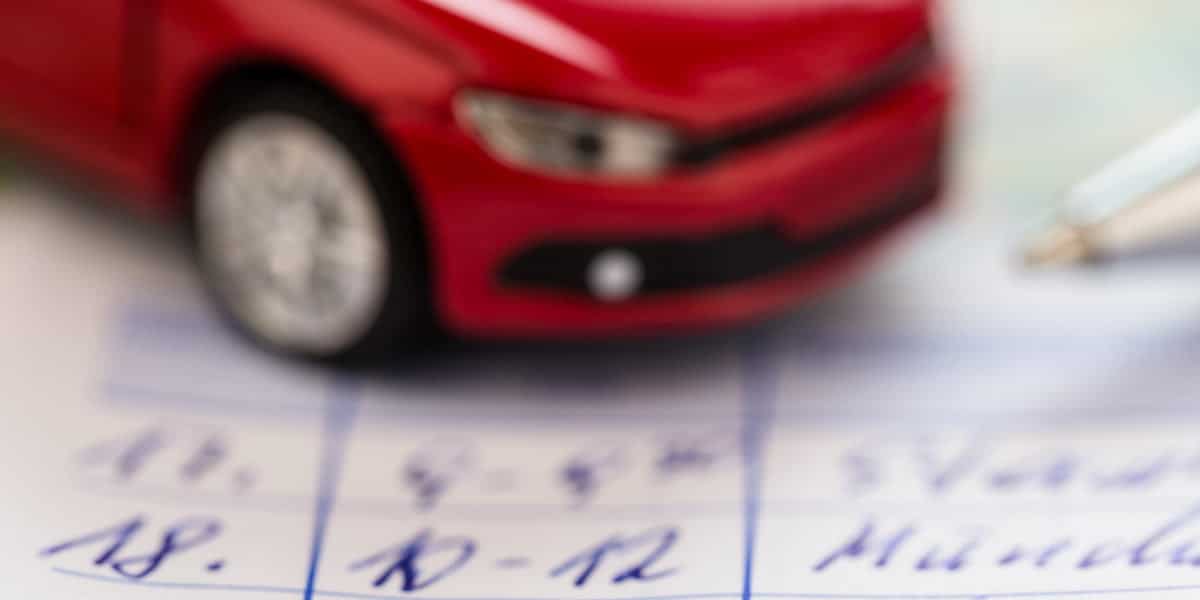Wann muss ein Fahrtenbuch geführt werden?
Ein Fahrtenbuch muss geführt werden, wenn die Nutzung des Fahrzeuges steuerlich geltend gemacht werden soll. Dabei ist es egal, ob der Firmenwagen für private oder geschäftliche Zwecke gefahren wird. Gerade bei 1-Mann Betrieben geht das Finanzamt davon aus, dass der Firmenwagen auch für private Zwecke genutzt wird. Deswegen ist es wichtig, in einem Fahrtenbuch das Verhältnis geschäftlichen zu privaten Fahrten, festzuhalten.
Vor allem wer einen Firmenwagen fährt, der stößt im Regelfall auf die Problematik sich bei der Berechnung der gefahrenen Kilometer entscheiden zu müssen: Rechne ich nach der 1% Regelung ab, oder nutze ich die Möglichkeit eines Fahrtenbuches? Weil es schwierig sein kann die dafür notwendigen Berechnungen selbst umzusetzen gibt es Plattformen, die mittels eines Firmenwagenrechners den Mehrwert eines Firmenwagens sichtbar machen, als auch visualisieren, welche Ersparnisse es je nach Berechnung gibt. Wichtig ist, dass man sich wirklich im Vorfeld intensiv mit diesen Zahlen auseinandersetzt, um im Nachhinein nicht draufzahlen zu müssen.
Durch das Führen eines Fahrtenbuchs muss nämlich dokumentiert werden, über wie viele Kilometer das Fahrzeug geschäftlich und privat genutzt wurde. Nur Fahrten, die für geschäftliche Zwecke gemacht wurden, sind als Betriebsausgabe abzurechnen.
Die Alternative zum Führen eines Fahrtenbuches
Wenn Sie das Fahrzeug auch privat nutzen und die Nutzung des Fahrzeuges steuerlich geltend machen wollen, wird die 1%-Regelung angewendet, wenn Sie kein Fahrtenbuch führen. Damit wird ein Prozent des Bruttolistenneupreises des Autos als Wert angesetzt, den Sie als Betriebseinnahme in Ihrer Bilanz monatlich versteuern müssen. Wer die 1% Regel anwendet, spart eine Menge Zeit gespart, da das lästige Führen eines Fahrtenbuches nun entfällt. Leider ist die 1%-Regelung oft finanziell ungünstiger, als das Aufzeichnen der Fahrten in einem Fahrtenbuch.
Das kann mehrere Ursachen haben: Je mehr ein Fahrzeug beruflich genutzt wird, desto ungünstiger ist die 1%-Regelung, denn Sie können mehr Ausgaben steuerlich absetzen. Des Weiteren gilt: Je neuer Ihr Fahrzeug, desto günstiger ist die 1%-Regelung. Das Finanzamt orientiert sich bei der Versteuerung immer am 1% des Neupreises des Fahrzeugs. Auch wenn Sie ihr Firmenauto gebraucht gekauft haben, so wird trotzdem mit 1% des Neupreises gerechnet. Es lohnt sich also zu prüfen, ob die 1%-Regelung oder das Führen eins Fahrtenbuches steuerlich die bessere Buchhaltung für Sie ist.
Oft ist es so, dass es sich zwar zeitlich, aber nicht finanziell lohnt, die 1%-Regelung anzuwenden. Wer sich nicht sicher ist, sollte im ersten Jahr das Fahrtenbuch anwenden, um den direkten Vergleich zu haben. Sie können die 1%-Regelung nur anwenden, wenn Sie das Auto mehr als die Hälfte zu Arbeitszwecken nutzen. Unterhalb dieser Grenze sind Sie angehalten, ein Fahrtenbuch zu führen.
Ist das Fahrtenbuch der 1% Methode vorzuziehen?
Hier ist es schwierig, eine pauschale Antwort zu geben. Dies kann für jeden Einzelfall anders liegen. Wenn die Anwendung der 1% Methode gegeben ist, sollte sich jeder Fahrer eines beruflich privat genutzten Fahrzeuges überlegen, welche Bilanzierung er anwendet. Hier sind einige Beispiele, für dies sich die Nutzung der 1% Methode wahrscheinlich nicht lohnt.
- Wenn das Fahrzeug überwiegend zu beruflichen Zwecken genutzt wird.
- Wenn der Bruttolistenneupreis des Autos ist recht hoch ist.
- Wenn das Auto gebraucht gekauft wurde oder relativ alt ist.
- Wenn das Auto ist bereits vollständig abgeschrieben ist.
Oftmals ist das Führen eines Fahrtenbuchs lohnenswert. Schließlich können hier alle Kosten, die für das Fahrzeug anfallen (Sprit, Werkstatt, KFZ-Versicherung, KFZ-Steuer, TÜV-Kosten, Parkgebühren, etc.) aufgeführt werden. Empfehlenswert ist es auch, zusammen mit dem Fahrtenbuch alle Quittungen und Rechnungen aufzubewahren. Bußgelder können übrigens nicht steuerlich geltend gemacht werden. Auch Mautgebühren auf privaten Fahrten dürfen nicht mitgerechnet werden.
Wie muss ein Fahrtenbuch richtig geführt werden?

Bei jeder einzelnen Fahrt müssen bestimmte Angaben gemacht werden, um sicher zu stellen, dass das Finanzamt alle Einträge später anerkennt. Grundsätzlich unterscheiden die Behörden zwischen Betriebsfahrten und Privatfahrten. Betriebliche Fahrten sind genauer zu dokumentieren, als Fahrten, die privat gemacht wurden.
Wer den Wagen beruflich nutzt, muss für eine Fahrt folgendes festhalten:
- Das Datum der Fahrt
- Den Kilometerstand vor Abfahrt und bei Ankunft
- Das Reiseziel und den Reisezweck
- Name der besuchten Firma/ Kunden
Bei Privatfahrten mit dem Firmenwagen sind das Datum, Reiseziel und die gefahrenen Kilometer einzutragen. Reisezweck oder besuchte Personen hat das Finanzamt nicht zu interessieren und hierzu müssen Sie keine Angaben machen.
هناك أسطورة أن أدوية الفعالية مكلفة للغاية ، وليس كل الرجال يمكن أن تحملها للاستخدام المنتظم. العديد من الرجال يريدون معرفة ما هي تكلفة الفياجرا في دبي ، ويمكنهم التحقق من ذلك في الصيدليات عبر الإنترنت






